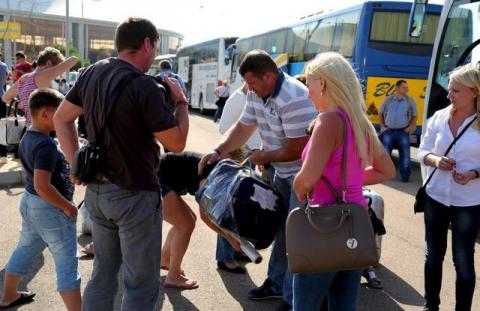Advertisement
Egypt says foreign powers ignored calls to fight terrorism
CAIRO (Reuters) - Egypt criticized its foreign partners on Saturday for ignoring calls to work harder to combat terrorism, after Western intelligence sources said there were signs Islamist militants may have bombed the Russian plane which crashed in Sinai.
An Islamic State affiliate has claimed responsibility for the crash of the Airbus A321 operated by a Russian carrier that was bringing holidaymakers home from the Sinai Peninsula resort of Sharm al-Sheikh one week ago.
All 224 people on board were killed in what the militants described as revenge for Russian air strikes against Islamist fighters in Syria.
Russia, Turkey and several European countries have suspended flights to Sharm al-Sheikh and the United States has imposed new air travel security requirements in the wake of the crash.
Egypt's Foreign Minister Sameh Shoukry, speaking hours before authorities were due to make an announcement about their investigations so far, said it would be wrong to speculate on the cause until findings were delivered.
But he said Cairo was not ruling out any possibility, and suggested countries now flagging the likelihood that militants were behind the crash should have heeded Egypt's repeated calls for coordination to combat militants.
"The spread of terrorism, which we have for a long time called on our partners to tackle more seriously, did not get through to many of the parties which are now exposed and which are currently working for the interests of their citizens to face this danger," Shoukry told a news conference.
He also expressed frustration that foreign intelligence about the cause of the crash had not been passed on to Cairo.
"The information we have heard about has not been shared with Egyptian security agencies in detail," he said. "We were expecting that the technical information would be provided to us."
EXPLOSION
An Egyptian source close to the investigation of the Russian plane's black boxes said on Wednesday the cause of the crash was believed to be an explosion, but it was not clear whether that was the result of a bomb.
Western intelligence sources have said British and U.S. spies intercepted "chatter" from suspected militants suggesting that a bomb, possibly hidden in luggage in the hold, downed the plane.
U.S. television network NBC said some communications between Islamic State leaders in Syria and the Sinai Peninsula included boasts about bringing down the jet. "They were clearly celebrating," it quoted U.S. officials as saying.
On Friday, Moscow suspended flights to Egypt, leaving nearly 80,000 Russians stranded, mainly in the Red Sea resorts of Hurghada and Sharm al-Sheikh, and adding to the growing chaos facing many tourists.
British attempts to fly home thousands of holidaymakers on Friday were mired in confusion when Egypt restricted the number of flights, citing capacity limits at Sharm al-Sheikh airport and British airliners' refusal to take passenger luggage in the hold.
British media reported on Saturday that a British passenger jet came close to being hit by a rocket as it came in to land at Sharm al-Sheikh in August, although the British government said it concluded the incident was part of routine Egyptian military exercises, not a deliberate attack.
The pilot of the Thomson flight from London to Egypt took evasive action after spotting the missile coming toward the plane as it flew to the Red Sea resort, the Daily Mail reported.
Egypt's Tourism Minister Hesham Zaazou said Cairo regretted the suspension of flights and was doing all it could to secure its airports and tourist sites, adding that he would fly to Sharm al-Sheikh to oversee measures to support tourists there.
(Writing by Dominic Evans; Editing by Michael Georgy and Janet Lawrence)



















Add new comment